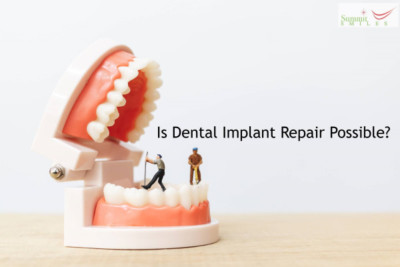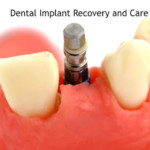Dental implant complications are uncommon due to their higher success rate when compared to other treatment options. If there is a problem with your dental implant, we will be able to repair it and quickly resolve the situation.
Why Is Dental Implant Repair Important
 Dental implants may need to be repaired or replaced for a variety of reasons. Whether your dental implant was chipped in a traumatic accident or you cracked it while eating hard candy, it is critical to have the damage repaired as soon as possible. This is due to the fact that a broken implant can interfere with your ability to eat, speak, and so on. The best way to fix the problem is to get a completely new implant installed. You won’t have to worry about the function or appearance of your smile this way.
Dental implants may need to be repaired or replaced for a variety of reasons. Whether your dental implant was chipped in a traumatic accident or you cracked it while eating hard candy, it is critical to have the damage repaired as soon as possible. This is due to the fact that a broken implant can interfere with your ability to eat, speak, and so on. The best way to fix the problem is to get a completely new implant installed. You won’t have to worry about the function or appearance of your smile this way.
Reasons Dental Implants Fail
There are several reasons why dental implants may need to be repaired or replaced. Whether your dental implant was chipped in a traumatic accident or you cracked the implant while eating hard candy, it is critical to have the damage repaired as soon as possible. This is due to the fact that a broken implant can impair your ability to eat, speak, and so on. The best way to fix the problem is to have a completely new implant installed. This way, you won’t have to worry about the function or appearance of your smile.
Read about Teeth Implants for Seniors
The following are the leading causes of dental implant failure:
Improper implant placement – The implant is installed at an incorrect angle in an area with insufficient bone support. This is usually the result of a surgical error.
Leakage of dental cement-Too much dental cement is attached to the dental crown, causing the cement to leak into the gums. This can lead to bacterial growth and infection.
Crowns that don’t fit – Crowns that are not properly attached to the adjacent teeth create open spaces that trap food particles and allow bacteria to grow, potentially causing infection.
Gum disease or bone deterioration – Dental implants, like natural teeth, require healthy gum tissue and underlying bone to support and hold them in place. If gum disease develops during treatment, the tissue can become inflamed and eventually loose.
Wear and tear – Your implants, like any other dental appliance, may need to be replaced after years of wear and tear.
How to Repair Dental Implants
Dental implants have a success rate of 95% or higher and are highly recommended due to the strength and stability they provide for extended periods of time. It is also critical to practice good oral hygiene because it aids in the prevention of diseases and infections that can shorten the life of your implant.
- If you have dental implants that need to be repaired, your treatment will be tailored to your specific requirements. The specifics of your treatment are critical, and we will use the least invasive treatment possible to restore your smile.
- If the screw is damaged, there are treatments available to save the implant and restore your smile.
- If the implant fixture and abutment are deeply rooted in the surrounding bone, it is unlikely that a chipped implant will also damage the deeply rooted components.
- If you’ve fractured your dental implant as a result of trauma, the chip has most likely only damaged the crown. The crown damage would not affect the dental implant itself, and only the crown would need to be replaced.
- If the implant fails, the procedure can be repeated up to four times. The first step is to carefully remove it, which may necessitate surgery. A bone graft may be required depending on the condition of your jawbone. If the implant becomes loose due to a lack of density, it is critical to address the issue before replacing the implant. You will need to recover from this procedure before receiving a new implant..
Learn How long does pain last after dental implant?
Our dental professionals will conduct an initial examination to determine the problem and how extensive it is. This involves physical examination along with x-rays so we can determine the density of your jawbone. Once we determine the appropriate solution for your case, we can assist you on how to proceed with your dental implant repair. Our specialists will focus on your complete oral health and ensure that you’ll have access to all the procedures you need.
Sources:
- Dental implants FAQs. American College of Prosthodontists.
- Short-term objective and subjective evaluation of small-diameter implants used to support and retain mandibular prosthesis


